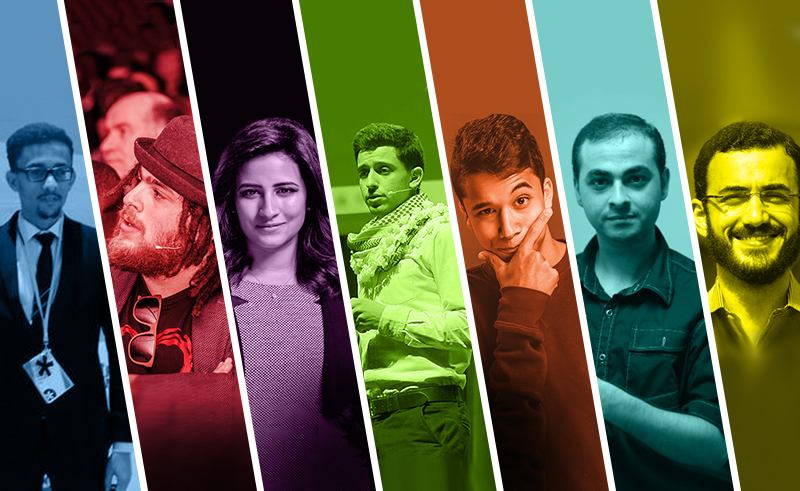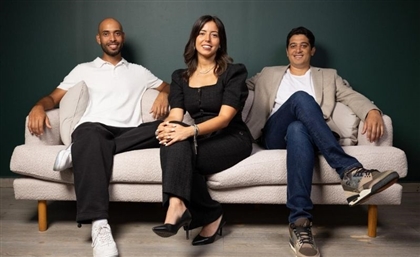7 MENA Startups Using Technology To Help People with Disabilities
Using VR, IoT, or AI to tackle some of the most pressing challenges people with disabilities face, these purpose-driven Arab startups are easing communication, mobility, and detection in a mind-blowing way.

"When passion and expertise meet a cause, great things happen," Ahmad Al-Kabbany, co founder of VRapeutic - a startup using VR to treat autism - asserts. More than 45 million people in the world are legally blind or partially sighted and 1 percent of the world's population is autistic, while there are millions or people with disabilities.
Research underscores the significant effect technology can play in the enhancement of a patient's experience, be it virtual reality, artificial intelligence or a smartphone application. Striving to create solutions that allow people with disabilities to engage and become active members of society, several initiatives are sprouting in an effort to build a more inclusive society and allowing the disabled to pursue their full potential. These seven Middle Eastern startups have taken it upon themselves to apply their knowledge, technology and resources to develop tools used for daily assistance, whether its self-navigation, peer-to-peer communication, emotional distress or financial management.
1. Dalil (Algeria)
The winner of SeedStars Algeria and one of the top 15 startups at the Harvard Africa Business Conference all in 2016, Dalil is a system that assists the visually impaired in navigating an unknown environment through object and obstacle detection. By wearing camera glasses and being connected to a smartphone application, the device recognises the surroundings - without the need to hold the phone - and instructions are given vocally.
"At a first stage, we will be launching the application alone in October," Mennouchi Islam, CEO of Dalil says, "the glasses will come after as an extension that people can buy or not because the app already can be linked to a watch, for example." After winning SeedStars Algeria, the team was granted a $20,000 fund from Djezzy - Algeria's leading telecommunications company - and Islam asserts that they will be incubated by Ryerson University's DMZ program in Canada starting September for four to six months. "We are actually working on other multiple projects now in the IoT and AI field like drones for detection and navigation," Islam continues. Although it will cost $3 per month to use, Dalil is still tackling mobility and detection challenges for the visually impaired.
2. MindRockets (Jordan)
The Jordan-based startup assists the hearing impaired by translating Arabic text or speech to sign language depending on the specified country, as it differs greatly. While Arabic and English languages have been developed, their vision includes expansion to others. "We have 60,000 downloads on an individual level to communicate with deaf friends or family," says Malek Zuaiter, the startup's Business Development Executive. "At an institutional level, we are integrating it into the infrastructures around us like services, pharmacies, airports, whatever you can think of; we can make design solutions based on this technology to make that accessible for deaf people," he explains.
The startup relies on strategic partnerships, sponsorships, and government funding for their revenue stream as the application is offered for free on both Google Play Store and Appstore. Zuaiter explains that the CEO and founder, Mahmoud Darawshi, developed the product in high-school as a result of his school participating in the Intel ICEF Awards. "This is what happens when you go find talented people and a need in society, and just put them together," Zuaiter believes. Darawshi then quit his job to work full-time on what he believed will really make an impact.

Malek Zuaiter, Business Development Executive at MindRockets, pitching at SeedStars World 2017 in Switzerland.
3. VocalEyes (Egypt, Palestine, India)
Putting their software on an affordable hardware that costs less than $40, VocalEyes is helping those with visual impairments navigate the world through state-of-the-art machine learning software. All the user has to do is point at any object and, using artificial intelligence, the application is able to identify objects with its characteristics in real time. Although there is a free application available, the team's thorough research concluded that the majority of visually impaired individuals do not own smartphones, especially if they are children.
Joining forces from all over the world, the three high school students met at MIT Launch last summer and developed the application in less than a month: Egyptian CEO, Marwan Refaat, Palestinian COO, Mahmood Alfayoumi and Indian CTO, Neil Deshmukh. Having been mentored by prominent Harvard Business School and MIT professors and getting advice from Google and Microsoft, the team received an abundance of knowledge and expertise from those in the field. Refaat says, "we piloted VocalEyes at the Perkins School for the blind in Massachusetts, but we want to do next is to get it to work in Arabic for Egyptians."
4. Entaleq by Helm Egypt (Egypt)
Awarded third place at Total’s Startupper of the Year 2016 challenge, Entaleq is driving economic and social progress through their platform, which locates over 800 accessible places across Egypt. The application is under the bigger umbrella of Helm, an NGO that aims to promote full inclusion of disabled individuals in all aspects of life - specifically employment. The startup has garnered the attention of top companies - like Pepsico, Al-Futtaim, BMW and Mall of Arabia - to cooperate, with their Entaleq platform not only documenting their services, but also empowering them to take steps towards a more accessible Egypt. In partnership with Vodafone Egypt's Foundation, Helm is encouraging companies to associate their brand with positive work through disability services such as parking spots, washrooms, ramps and braille menus.

Founded by Amena El-Saie and Ramez Maher, Helm was awarded third place in 2016's Startuppers of The Year.
5. VRapeutic (Egypt)
Using VR technology to develop therapeutic solutions, VRapeutic is an Egyptian research-based software startup that focuses on helping patients with autism; by collaborating with therapy centres in Alexandria and Doha, they create content that supplements the classical approaches that take place in a typical therapy session. "We are expected to work side-by-side and offer the services through public and private hospitals, therapy and rehabilitation centres, and private clinics," Ahmad Al-Kabbany, co-founder of VRapeutic, tells StartupScene.
A finalist at MIT Arab Startup Competition 2017, the startup not only offers one-size-fits-all VR content, but customisable solutions that address the diverse personal needs of autistic people. They have developed their prototype, and are currently iterating on its design, in collaboration with three therapy centres in Egypt and the Gulf region. "It has been found that the effect of VR on pain reduction is quite close to that of narcotics. In the case of autism, a study commented that VR intervention provided years of social training in a few sessions," Al-Kabbany explains. Passionate and committed to drive social change in their community, the team behind VRapeutic also sponsored the first AR/VR meet-up in Egypt - held in Alexandra. "Our future plans involve addressing other disorders and use cases such as dyslexia, PTSD, physical therapy, pain management, addiction, and elder care," Al-Kabbany says.
6. ReAble (Lebanon)
"Having the privilege of growing up with a special needs sibling, I have experienced the huge gap between his often mind-blowing talents and the bottlenecks preventing him from realising his full potential to develop into an integrated member of society," Emile Sawaya, the Lebanese entrepreneur behind ReAble says. After meeting his co-founder, who is legally blind, the two men were driven to create ReAble, an application that uses technology and human-centric development to provide users with global access to the inherent right to financial independence.
Tackling one of the most pressing challenges for individuals with cognitive difficulties, ReAble guides users through the process of conducting a payment, allowing guardians to be informed on their financial transactions and making budgeting seem like a piece of cake. A text-to-speech feature is also included, which can be turned on or off depending on preference. In an effort to give back to the community and in alignment with their mission, their application is at no charge for the first year on Android's Play Store.

ReAble co-founder, Emile Sawaya, during the Barclays' Accelerator Programme powered by TechStars in Cape Town.
7. Swift Braille (Palestine)
Hailing from Gaza, this Palestinian startup offers an Arabic-speaking application tailored to help the blind communicate. Having won the AlSabah Award and represented Palestine in the World Summit Award finals, Swift Braille is a free application on Google Play Store that allows visually impaired users to type by connecting dots in the shape of letters. Using one finger, the user can type letters, numbers and symbols in Arabic, English, French and Spanish, and choose the layout based on comfort and preference.
Founded by Mohamed AlBanna, the startup includes a text-to-speech feature - for those who want to ease the communication process even further. Aiming to create a profitable and sustainable model, the startup will include paid features that will provide the user with a faster and more accurate experience. "Supporting more languages, adding more functionalities to the keyboard, and making it available on more platforms are my plans for the future, " AlBanna tells Startup Scene. "There is a lack of electricity here in the Gaza strip - where I’m living right now- so i’ve released the project as an open source (which is available to be developed by any other developers around the world), to help other developers to improve their apps for blinds and visually impaired." AlBanna hopes to engage in more global competitions, despite the challenges posed by political instability and lack of support in local entrepreneurship.






















